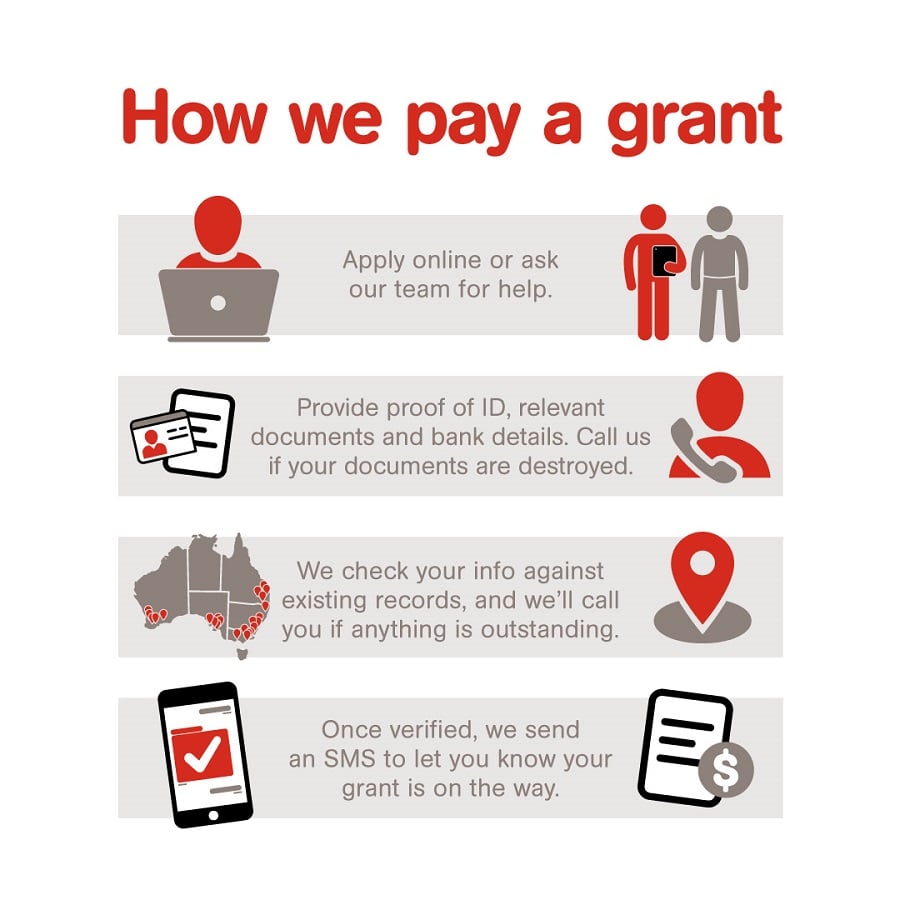This is what it takes to pay a grant
These are the steps we take to provide financial assistance to people affected by the bushfires.
Figures correct at Monday 10 February 2020

Paying a grant is a balancing act between compassion, obligation and diligence.
Compassion because people have just been through the worst day of their lives. Obligation because Australian law has very specific requirements about who and how we can help. Diligence because the Australian public has trusted us to make sure their generosity reaches those who need it most.
Our aim is to help those doing it toughest.
The tax and charity laws that enable Red Cross to collect money for people affected by disasters are fairly specific about what we can use this money for. For example, we have to prioritise those experiencing the most severe hardship.
We created a simple online application process.
This is for two reasons. First, to enable as many people as possible to apply without delay. Second, because we need to collect personal information to process each application, and Australian privacy law requires a secure online system for that.
We need to do some basic checks.
We ask people only for the most essential information: proof of identity; proof of residence (if applying for a grant about their primary place of residence); proof of hospitalisation (if applying for an injury grant); and bank details so we can pay the grant.
The majority of applications don’t arrive with all three.
Sometimes people’s documents have been lost in the fires. Sometimes people are exhausted and desperately trying to do lots of things at once. Too often, sadly, because the application is fraudulent or from a bot.
Most applicants get a phone call.
We do all we can to help people get this money. If they are missing documents, we call them to ask why. We gently explain why we need bank statements rather than an account number scribbled on a post-it note. We work out other options.
Every day our grants team makes and receives hundreds of phone calls to help people with their applications. These calls often include psychological first aid to help people still feeling trauma, and referrals to government assistance and other services.
(We refer the forged licences and fake addresses to the police.)
Then we have to verify their circumstances.
For grants relating to homes, we need to compare the address with fire scar data from government. This has its limitations, and not all homes show up. If there’s doubt, we verify information using data from state-based emergency services.
If we still can’t confirm fire damage, we send someone to investigate in person. We take photos and sign declarations.
For injury grants, we need to validate that people have been injured as a direct result of a bushfire, were hospitalised within two weeks of the fire, and spent two or more days in hospital.
What about the hundreds of people who don’t have internet access yet?
We’re going out to them, as fast as we can. We’re in recovery centres and we’re knocking on doors.
Last week, our volunteers were in Bega, Batemans Bay, Uladulla, Balmoral Village, the Snowy Valley, Lithgow, Hawkesbury, the Snowy Mountains, Lobethal, Parndana, Woodside, Mallacoota, Bairnsdale, Corryong, Cann River, Genoa, Warewa, Ensay, Swifts Creek, Wulgulmerang and Clifton Creek.
We’ll go back to most of these places next week, to find people we’ve missed. And several more locations besides. Volunteers and staff who were exhausted and resting after a month of intense fires are saddling up again.
And the people who have lost loved ones?
We have a bereavement grant for the senior next of kin of people who died in the fires. We work directly to get this grant to people discreetly and sensitively, away from the public eye.
It’s all worth it when …
At 3pm each day, we send well over a hundred text messages to let people know their applications are verified and payment will soon hit their bank accounts.
For the last two weeks, we’ve averaged a million dollars out the door each day. By Friday 7 February, we’d approved more than $27 million in payments and we’re not slowing down.
And every day we get notes like this, which fill our hearts and keep us going.
The road back to normal living is going to be long and hard but it is with the help of people like yourselves that will get us there just that little bit quicker. We are so appreciative of any help we get and thank you from the bottom of our hearts along with all the people that donated to Red Cross and want to let everyone know that it really is making a difference to our lives.
If you’ve been affected by the fires, you are our first priority.
Call us, email us, talk to us. We’ll listen with empathy and do everything we can to help.
Charity donations of $2 or more to Australian Red Cross may be tax deductible in Australia. Site protected by Google Invisible reCAPTCHA. © Australian Red Cross 2024. ABN 50 169 561 394